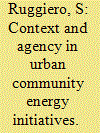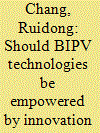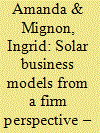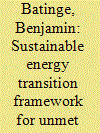|
|
|
Sort Order |
|
|
|
Items / Page
|
|
|
|
|
|
|
| Srl | Item |
| 1 |
ID:
175900


|
|
|
|
|
| Summary/Abstract |
In this paper, we analyse community energy (CE) projects in urban settings. Building on insights from the literature on the geography of sustainability transitions, we examine how contextual conditions promote or hinder the development of CE. Furthermore, reflecting on calls for greater attention to agency in transitions, we investigated how actors engaged in urban CE projects exploit beneficial conditions or overcome obstacles related to some of the contextual conditions. Empirically, we draw on six case studies of CE projects from the Baltic Sea Region. To develop a thorough understanding of our cases we conducted 24 semi-structured interviews and analysed numerous secondary sources. Our results show that institutions as well as visions, e.g. plans for future energy generation, are important contextual features for urban CE projects. Local actors seek to overcome unfavourable contextual conditions for CE initiatives by building trust, appealing to their community's sense of identity, networking, and promoting demonstration projects. Based on the results, we recommend that local and national governments address the following four issues to strengthen the role of CE in the transformation of urban energy systems: 1) harmonising policies; 2) creating a culture for transitions; 3) developing visions for CE; and 4) promoting policy learning from experiments.
|
|
|
|
|
|
|
|
|
|
|
|
|
|
|
|
| 2 |
ID:
191219


|
|
|
|
|
| Summary/Abstract |
Hydrogen can be key in the energy system transition. We investigate the role of offshore hydrogen generation in a future integrated energy system. By performing energy system optimisation in a model application of the Northern-central European energy system and the North Sea offshore grid towards 2050, we find that offshore hydrogen generation may likely only play a limited role, and that offshore wind energy has higher value when sent to shore in the form of electricity. Forcing all hydrogen generation offshore would lead to increased energy system costs. Under the assumed scenario conditions, which result in deep decarbonisatiton of the energy system towards 2050, hydrogen generation – both onshore and offshore – follows solar PV generation patterns. Combined with hydrogen storage, this is the most cost-effective solution to satisfy future hydrogen demand. Overall, we find that the role of future offshore hydrogen generation should not simply be derived from minimising costs for the offshore sub-system, but by also considering the economic value that such generation would create for the whole integrated energy system. We find as a no-regret option to enable and promote the integration of offshore wind in onshore energy markets via electrical connections.
|
|
|
|
|
|
|
|
|
|
|
|
|
|
|
|
| 3 |
ID:
166558


|
|
|
|
|
| Summary/Abstract |
As new renewable energy applications, building-integrated photovoltaics (BIPV) systems have significant potential to facilitate energy transitions towards renewable energy in highly urbanized countries, where large areas of land for developing large-scale solar or wind farms are limited. Government policy plays a significant role in nurturing and protecting energy innovations at the early development stage, such as BIPV. However, various actors could have divergent views on the policies for energy innovations, and policymakers need to consider these views in policymaking to avoid potential failures in policy implementation. By taking BIPV as an example, this study aims to reveal stakeholders' different perspectives on the required innovation policies for new energy technologies based on Q methodology. The results indicate even though stakeholders share similar views on some aspects of BIPV policies, four significantly distinct policy perspectives on BIPV exist in stakeholders' mindsets, including supervisory support, intensively investigate, cautiously stimulate and proactively promote. These policy perspectives require significantly different approaches to promote BIPV, which indicates the complexity in formulating one set of policy mix catering for the various mindsets of stakeholders. This study has both theoretical contributions to innovation policy mix for energy transitions, and policy implications for promoting energy innovations, especially BIPV worldwide.
|
|
|
|
|
|
|
|
|
|
|
|
|
|
|
|
| 4 |
ID:
186430


|
|
|
|
|
| Summary/Abstract |
A worldwide transition towards sustainable energy systems requires the diffusion of renewable electricity technologies. To achieve this, recent research has put emphasis on the role of business models as catalysts for sustainability transitions, particularly in the case of solar photovoltaics. Authors have identified a variety of solar business models that can be characterized based on roles, activities, and applications. In contrast, on the market, solar firms use business models to communicate their offer to clients, focusing on customers’ needs, how they organize their resources and activities to meet these needs and, in return, create value for themselves. The aim of this paper is to bridge the gap between the way energy policy literature describes solar business models, and the way solar firms use them to communicate with their clients. The business models of 241 solar firms in Sweden were mapped and analyzed using a framework developed by Richardson (2008) as well as the roles, activities, and applications as highlighted in solar business model literature. This led us to identify six types of solar business models. We found that there are some gaps and overlaps between theoretical and empirical solar business models which, in turn, have implications for theory and policy.
|
|
|
|
|
|
|
|
|
|
|
|
|
|
|
|
| 5 |
ID:
166560


|
|
|
|
|
| Summary/Abstract |
Efficient energy supply is a means for people to gain access to a wide range of energy-related services. In unmet energy markets where energy supply is inadequate or lacking, such services, and the resulting benefits, are seldom attained. This has prompted research on energy transition, specifically a transition to renewable energy, to rapidly diffuse energy access in these regions. Existing energy transition frameworks are predominantly contextualised in developed economies, with little evidence of their applicability in the context of developing countries. This paper proposed an energy transition framework for the unmet electricity markets, after conducting a systematic review of the literature on energy transitions, specifically relating to sustainable transitions of electricity systems. Contextual limitations observed in the energy transition literature included market demand, scale of energy infrastructure, type of energy resource, transition duration, novelty of opportunities, and level of external influence. An energy transition framework for unmet electricity markets was subsequently conceptualised. The key characteristics of this modified transition framework are: (i) traditional technology; (ii) defunct deceleration; (iii) a niche technology curve; (iv) landscape support for niches; and (v) new regime condensation (emergence). Contextual awareness in designing policy frameworks for energy transition is essential to achieve sustainable energy for all, particularly in unmet electricity markets.
|
|
|
|
|
|
|
|
|
|
|
|
|
|
|
|
| 6 |
ID:
181057


|
|
|
|
|
| Summary/Abstract |
The concept of Ego-Ecology captures environmental agendas that challenge a shared European environmental conscience in many respects. In fact, diverse populist actors such as the gilets jaunes movement and the extreme right of the Rassemblement National in France, or the right-wing populist party Fidesz in Hungary, do not reject environmental protection and climate action completely, but rather utilise them for their own agendas. The populist re-framing of environmental agendas challenges comprehensive problem-solving and supranational decision-making at the EU level. This potentially undermines a swift sustainability transition in Europe.
|
|
|
|
|
|
|
|
|
|
|
|
|
|
|
|
|
|
|
|
|